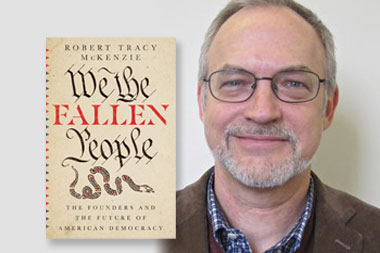The 2023 John Woolman Lectures will feature Robert Tracy McKenzie, professor of history and the Arthur F. Holmes Chair of Faith and Learning at Wheaton College. Both events are free to attend.
Schedule
Wednesday, March 22
7:00 p.m. in the Johnson Center, Room 106 | Lecture One
We the Fallen People: Redefining Ourselves for a Healthier Democracy
Abandoning the view of human nature that guided the country’s Founders, Americans for two centuries have justified democracy on false and romantic grounds. We think too highly of ourselves, and this comforting misperception magnifies our partisan polarization, intensifies our frustration with democratic institutions, and heightens our susceptibility to authoritarianism. A necessary first step to a healthier democracy will be to redefine ourselves as “We the Fallen People.”
Register
Thursday, March 23
7:00 p.m. in the Johnson Center, Room 106 | Lecture Two
"I am Full of Fears and Hopes:" Alexis de Tocqueville on Christianity and the Peril and Promise of Democracy
Alexis de Tocqueville’s Democracy in America has been rightly appraised as “the best book ever written on democracy and the best book ever written on America.” Tocqueville’s most important (and deeply troubling) insight is that the rise of democracy can result in tyranny instead of liberty. Whether it did so, he argued, would depend largely on the role played by religion. When the author visited the United States nearly two centuries ago, he found that Christianity was vital to the flourishing of American democracy. Would he reach the same conclusion today?
Biography
Robert Tracy McKenzie is professor of history and the Arthur F. Holmes Chair of Faith and Learning at Wheaton College. Before coming to Wheaton in 2010, he served for 22 years on the faculty of the University of Washington, where he held the Donald A. Logan Chair of American History. For most of his professional career, his research has focused on the effects of the American Civil War on the economy and society of the Upper South.
His first book, One South or Many? Plantation Belt and Upcountry in Civil War-Era Tennessee (New York: Cambridge University Press, 1994), investigated the economic effects of war and emancipation on the southern countryside, and received best-book awards from the Agricultural History Society and the American Historical Association-Pacific Coast Branch. His next monograph was Lincolnites and Rebels: A Divided Town in the American Civil War (New York: Oxford University Press, 2006). Recipient of the annual Fletcher Pratt Literary Award for best non-fiction work on the Civil War, Lincolnites and Rebels explored the civil war within the Civil War by tracing the experience of a single community split asunder by the sectional crisis.
Since coming to Wheaton, Professor McKenzie has turned his attention to the ways in which American evangelicals have remembered their national heritage. Toward that end, he authored a book on memory of the 'First Thanksgiving,' titled The First Thanksgiving: What the Real Story Tells Us about Loving God and Learning from History (InterVarsity Press, 2013). And most recently, We the Fallen People: The Founder and the Future of American Democracy.
About the John Woolman Lecture Series
The Lecture Series is named for John Woolman (1720-1772), a Quaker from New Jersey who provided much of the theological, intellectual, and ethical foundation for the earliest anti-slavery activities in America.
Drawing from traditional Christian, Quaker, evangelical, quietist, and rationalist sources, Woolman published works that encouraged others to rethink the Friends’ role in addressing a range of topics including slavery, working conditions, spiritual discipline, pacifism, the use of wealth, the use of time, and relationships with Native Americans.
His antislavery writings and speaking campaigns throughout the colonies helped prompt the Friends to become the first body of Americans to actively denounce slavery and require all its members to free any person that they held in slavery. Providing some of the earliest inspiration for the major ethical shift in thinking about slavery, Woolman’s writings and actions influenced leaders in the early antislavery and abolitionist movements in America and Great Britain. Woolman Hall, a residence hall on Malone’s campus, is named in his honor.

